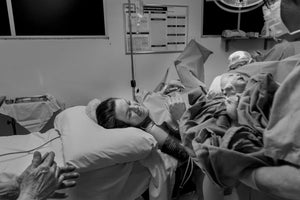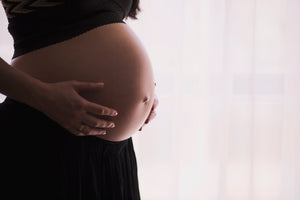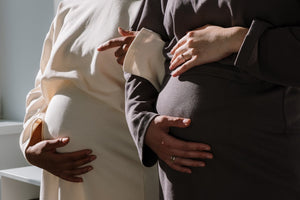Postpartum and Newborn Care | Recognizing Postpartum Depression and Seeking Support
Taking care of yourself and your baby after childbirth can be a challenge, especially if your birthing plan didn’t go as expected. Postpartum care includes both physical and emotional recovery, but once you know what to expect it can be easier in every way.
If you’re feeling a little sad after you get home and you’re wondering if it’s normal, you should know that many women feel a little overwhelmed after giving birth. Knowing when it’s normal and when it’s serious can help you determine what to do about it.
What Is Postpartum Depression?
There is a difference between having “baby blues” and experiencing true postpartum depression or PPD. Symptoms associated with baby blues include crying, feelings of sadness, and trouble eating or sleeping. They usually go away on their own. PPD, on the other hand, includes symptoms that are more severe and that tend to last a little longer.
Some of these symptoms can include:
- Severe problems associated with sleeping or eating
- Feelings of extreme sadness and feeling overwhelmed
- Feeling worthless or guilty
- Feelings of harming yourself or the baby
- Difficulty bonding with the baby
As you can see, PPD symptoms are different from the symptoms associated with basic baby blues. They are more severe all the way around and last much longer. The most important tip to remember when you’re experiencing these symptoms is to talk to your doctor even if you believe they are minor symptoms. Only a professional is able to ascertain the situation and figure out what to do next. Keep in mind that you may also need medication and therapy if your PPD is bad enough.
Can You Get Rid of PPD on Your Own?
In most cases, PPD requires either medication, therapy, or both. If you’re interested in seeking help for postpartum depression, you should know that it is nothing to be ashamed of and nothing that should cause you stress. In fact, PPD is not that uncommon and affects a lot of women who have just given birth. While you can’t get rid of it on your own, there are things you can do that can help you feel better, and they include the following:
- Get as Much Rest as Possible
This may seem impossible with a newborn in the house, but if you “sleep when the baby sleeps,” it can help. The more sleep you get, the faster you’ll heal, and not just physically. Even taking a 15- or 30-minute nap throughout the day can provide you with the rest you need, helping you with both physical and psychological healing. Keep in mind that your body has been through a lot, and it needs as much rest as possible right now.
- Make Time for Socialization with Others
Postpartum care can be isolating because it’s easy for you to feel like you’re completely alone. Even if you’re a loner, being alone day after day while taking care of the newest member of your family can be difficult. After you feel better, go ahead and accept invitations for people to come by and see you. Let people close to you come by and help with things such as cleaning and laundry. These types of socialization will do you a lot of good.
- Exercise When You Can
This is another suggestion that can be difficult to do, but even a 10-minute walk up and down the street can help you feel better both physically and emotionally. Naturally, you’ll have to get your doctor’s approval first, especially if you’ve had a C-section, but once you get that approval, some light exercise in the first few weeks after childbirth can be advantageous in numerous ways.
- Consider Taking Supplements
There are numerous supplements that help you heal physically after you give birth, including calcium, vitamin D, and certain fish oils. Look for omega-3 fatty acids such as DHA. Now is definitely not the time for your body to be deficient in vitamins and minerals, especially if you’re breastfeeding. Check with your doctor before taking these supplements, but if they say it’s okay, they can help both physically and emotionally.
- Eat the Right Foods
To heal both physically and psychologically, your diet has to be just right. Eating like you’re still pregnant is a great idea, and make sure that you have lots of fruits, vegetables, whole grains, and protein. These things give your body the nutrients it needs to heal, and keep in mind that eating smaller meals and snacks throughout the day can make it much easier than sticking to just three meals a day.
- Do Something to Make Yourself Happy
A new mom’s life is a very unselfish one, but when you’re going through your postpartum period, it’s crucial that you do something for yourself every once in a while. When you feel up to it, read a book, watch one of your favorite television shows, or take a nice warm bath after you light some candles first. You deserve this time alone, and it’s important that you take it.
Conclusion
PPD is different from baby blues, but taking good care of yourself and consulting with your doctor if you even think that you have it can make a big difference. When you eat right, exercise, and concentrate on doing things you love, as well as consult with your doctor when you feel the depression may be serious, it won’t be difficult to start feeling much better sooner rather than later.
Continue Reading
-
April 09, 2024
content
Postpartum Recovery: Healing Your Body After Childbirth
-
April 08, 2024
content
Third-Trimester Discomforts: Solutions for Back Pain, Swelling, and Sleep Issues
-
April 06, 2024
content
Third Trimester | Preparing for Labor and Delivery: What to Pack in Your Hospital Bag












